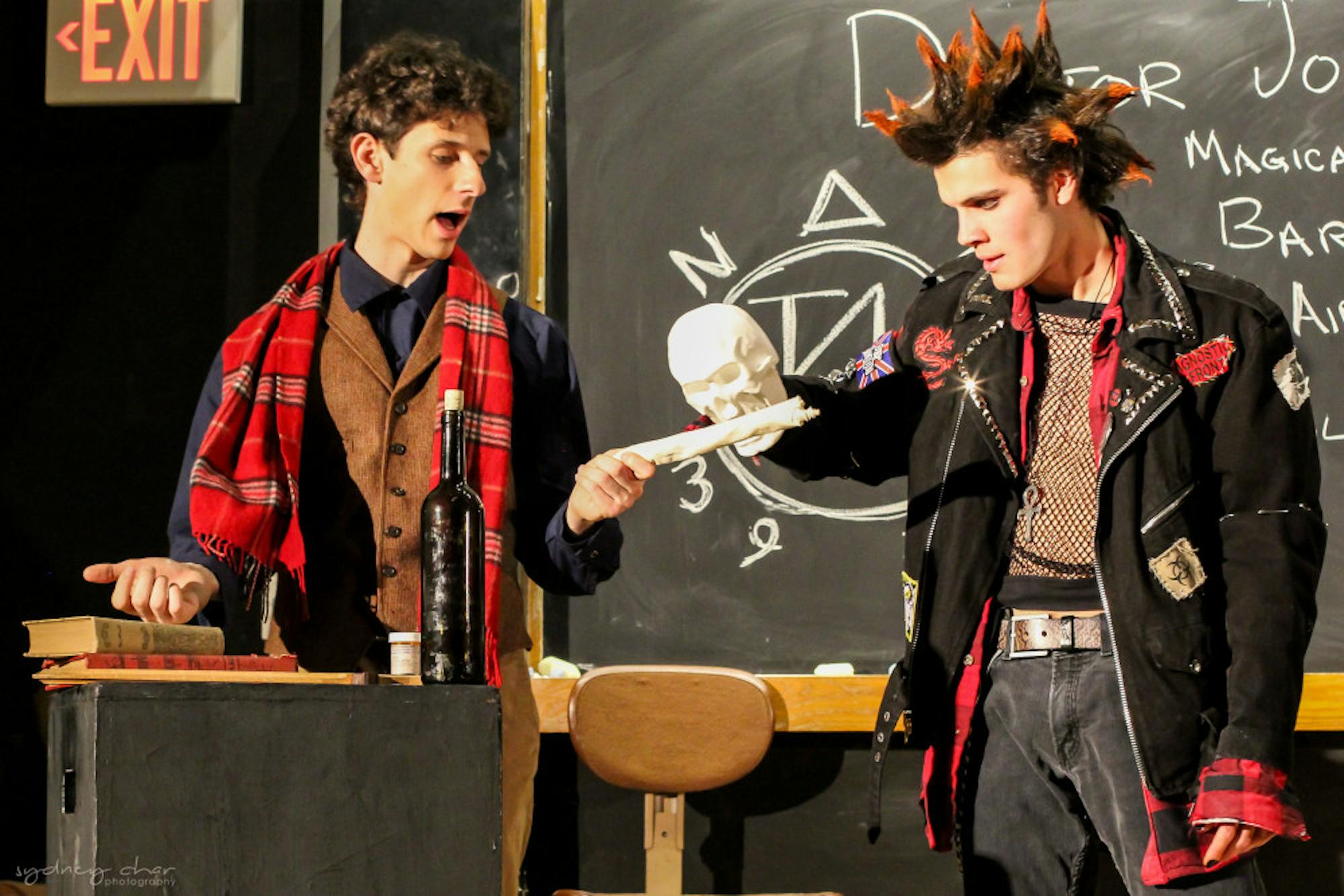The unaware student may have been slightly confused upon walking into Barnum 008 this past week, as there were some rather unusual course descriptions scrawled onto the blackboard at the front of the room. "Doctor John Faustus, Magical Arts 024, Barnum 008, Office: Aidekman 666, TA: Klaus Wagner" doesn’t exactly sound like the credentials of the latest Intro to International Relations professor. And yet, when sophomore classics and drama major Peter Secrest proposed his experimental version of "Dr. Faustus" (first performed in 1592) to the Bare Bodkin board in the fall, he knew this room was exactly where he wanted to show his performance. After attending a preview of the play, which ran Friday, April 3, and Saturday, April 4, the Daily had the chance to speak with Secrest about his inspiration for the performance and the diverse contributions of his cast and crew.
The play follows a discontented professor at Wittenberg University, Dr. Faustus, a brilliant man tired of the confines of the disciplines he has practiced. As noted on the Facebook event page for the performance, Faustus "sells his soul to the Devil for 24 years for unlimited magical powers. The Devil gives Faustus the custody of Mephistopheles [a demon] to do his bidding. The two travel around Europe pulling pranks and conjuring demon[s] and spirits."
Thinking back to how he arrived at "Dr. Faustus," Secrest recollected, "I [wanted] to do a show with puppetry … I was thinking about doing 'The Tempest,' but then I came to 'Dr. Faustus.' This play just spoke to me."
"Whenever you prepare a proposal show for Bare Bodkin, you have to come in with 'this is how it's experimental, and this is my vision,'" Secrest said, "so I came in with a lot of beat generation, punk puppets and then I met with my designers in December and then they came up with a lot of the ideas."
One of the driving forces of the show is the interplay between the Beat generation of Faustus and the Punk movement of the demonic world. Secrest cited Jack Kerouac and The Violent Femmes, an alt-rock band from the '80s, as two of his major sources of inspiration for the world of his characters.
"I listen to a lot of [The Violent Femmes], and they're not necessarily punk, they're like alternative rock/punk. But that music really spoke to me, so I looked into a lot more punk and looked into The Sex Pistols and The Ramones and kind of created off of that … and that's I think my directing style … I usually use music as a way of inspiration, and that's usually where I can latch onto an idea."
The other major experimental force in the play, the puppetry, was very well executed in the preview.
"I've been doing puppetry since middle school … and I took a class in the fall that was offered through the Drama Department, taught by Faye Dupras [professional puppeteer and guest lecturer at Tufts in the Fall 2014 semester]," Secrest said. "Jonathan [Rooney, a first-year and technical director], Ally [Benko, a senior and co-assistant director and dramaturg] and I, we all took a master class in shadow puppetry.”
Dupras provided the group with slide projectors, and the cast and crew made all of the puppets themselves. One impressive use of the puppets was the way in which Secrest used them to play out the age-old symbol of the devil on one shoulder and angel on the other, trying to influence a person to change their habits in one direction or another. The cast and crew achieved this by dividing a screen into red and blue backlighting for a demon and angel puppet, respectively.
When asked if the religious significance of the past weekend, which included both Easter and Passover, was a factor in the timing of the performance, Secrest couldn’t help but give a small laugh. He noted, “I was reading the plays over winter break, and I got to the scene where they kill the Pope, and I was like, 'When's Easter?' And I looked it up, and I was like, 'Well, that's going to be fun.'"
On a more serious note, he said, "I think what's funny about this show too is that it comes off very anti-religious, but I don't think it is … I think it's more about temptation and sin, which I think makes it kind of a nice coincidence that it's for Easter when you have the holiday that honors Jesus, who died for everyone's sins, and you have Faustus, who dies for his own sins."
Secrest summarized the goal of his experimental rendition of Dr. Faustus when he echoed the sentiment of Benko: "It's about trying to honor the word, and I think, if anything, that's what a Bodkin Major does … try to honor the word, in new and different ways."
'Dr. Faustus' brings hell to the classroom

Andrew Prensky stars as Dr. John Faustus alongside his demonic servant, Mephistopheles, played by Ed Rosini.





